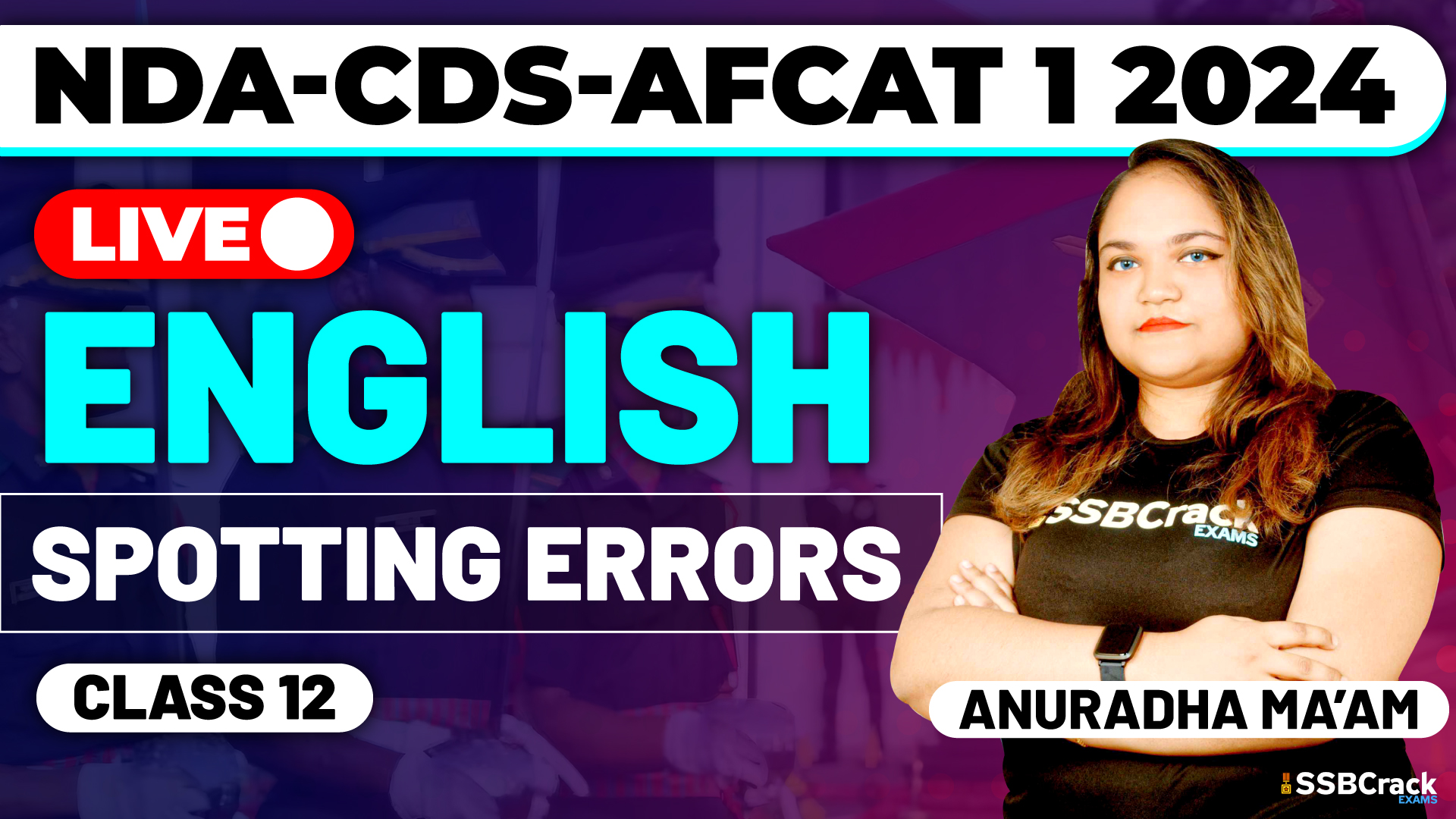In the realm of competitive exams like the National Defence Academy (NDA), Air Force Common Admission Test (AFCAT), and Combined Defence Services (CDS), the “Spotting Errors” section holds paramount importance. This section not only tests your grasp of English grammar but also your attention to detail and precision. Solving Multiple Choice Questions (MCQs) on spotting errors is both an art and a science. In this article, we will delve into the intricacies of spotting errors MCQs and explore strategies to tackle them effectively.
Understanding the Format
The spotting errors MCQs typically present a sentence divided into three parts, labeled as (a), (b), and (c). The task is to identify if there is any error in any of these parts. If you find an error, you must choose the corresponding letter (a, b, or c) as your response. If no error exists, you should select (d).
Q) When the party was over, (a)/ he looked around for the girl (b)/ who had come with him. (c)/ No error (d)
Ans. (d)
Q) After we were driving for miles (a)/ on the winding road (b)/ I was suddenly sick. (c)/ No error (d)
Ans. (a)
Q) The forecast was for fair (a)/ and warm weather (b)/ and the day dawned dark and chill. (c)/ No error (d)
Ans. (c)
Q) To write, to speak or to act (a)/ seems (b)/ very easy. (c)/ No error (d)
Ans. (d)
Q) I have not had tea (a)/ since (b)/ two days. (c)/ No error (d)
Ans. (b)
Q) The girls watched intently (a)/ as the model applied her make up (b)/ with a practiced hand. (c)/ No error (d)
Ans. (c)
Q) If he is a millionaire (a)/ he would help (b)/ the millennium project. (c)/ No error (d)
Ans. (a)
Q) The Prime Minister along with his Cabinet colleagues (a)/ have been welcomed by the Chief Minister (b)/ at a formal ceremony. (c)/ No error (d)
Ans. (b)
Q) Several guests noticed Mr. Sharma (a)/ collapsing in his chair (b)/ and gasping for breath. (c)/ No error (d)
Ans. (d)
Q) This is our second reminder (a)/ and we are much surprised (b)/ at receiving no answer from you. (c)/ No error (d)
Ans. (d)
Q) Guest is (a)/ unwelcome (b)/ when he stays too long. (c)/ No error (d)
Ans. (a)
Q) My friend and benefactor (a)/ has (b)/ come. (c)/ No error (d)
Ans. (d)
Q) Either he (a)/ or I (b)/ am mistaken. (c)/ No error (d)
Ans. (d)
Q) Each of (a)/ these substances (b)/ are found in India. (c)/ No error (d)
Ans. (c)
Q) Who (a)/ do you wish (b)/ to see? (c)/ No error (d)
Ans. (a)
For more questions, check out NDA-CDS-AFCAT 1 2024 Exam English Live – Spotting Errors – Class 12
Key Strategies to Excel in Spotting Errors MCQs
- Read the Sentence Carefully: The first and most crucial step is to read the sentence thoroughly. Understand the context and meaning of the sentence before scrutinizing the individual parts.
- Analyze Each Part: Examine each part of the sentence critically. Check for grammatical errors, subject-verb agreement, verb tense, pronoun antecedent agreement, article usage, and parallelism.
- Maintain Consistency: Keep an eye on consistency in the sentence. Make sure the verb tenses and sentence structures are uniform and logical throughout.
- Subject-Verb Agreement: One of the most common errors is subject-verb disagreement. Ensure that the subject and verb in the sentence are correctly matched in terms of number (singular or plural).
- Pronoun Usage: Pay close attention to pronouns and their antecedents. Make sure they agree in number, gender, and person.
- Article Usage: Be cautious with articles (a, an, the). Ensure they are used correctly based on the context. Articles play a significant role in sentence correctness.
- Parallel Structure: Look for parallel structure in lists or comparisons. Items in a list should be structured the same way for clarity.
- Elimination Technique: If you’re unsure, try the elimination technique. Go through each part systematically and rule out the ones that are undoubtedly correct. This can help you narrow down the options.
- Context Matters: Always consider the context of the sentence. Sometimes, the meaning of the sentence can guide you to the correct answer.
Common Errors to Watch For
- Subject-verb agreement errors.
- Pronoun-antecedent agreement errors.
- Verb tense errors.
- Misplaced modifiers.
- Inappropriate article usage.
- Lack of parallelism.
- Redundancy and wordiness.
Conclusion
Spotting errors MCQs require not just a solid understanding of English grammar but also a meticulous approach to detail. By following these strategies and focusing on common error types, you can navigate these questions effectively. Remember that practice is key to improving your skills in this section. Regular practice with spotting errors MCQs will sharpen your ability to spot and correct errors with precision. As you delve into the world of spotting errors, embrace it as an opportunity to enhance your English language proficiency, a valuable asset on your journey to success in the NDA, AFCAT, and CDS exams.







